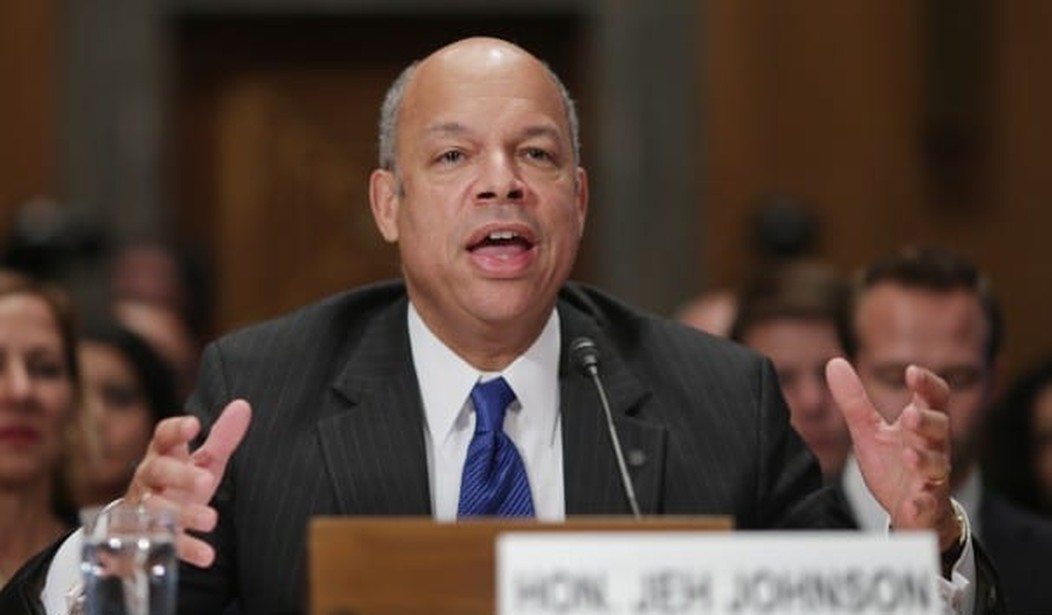Homeland Security Secretary Jeh Johnson said his department is actively “tracking” individuals who have re-entered the U.S. after fighting alongside ISIS and other terrorist groups in Iraq and Syria.
Johnson was asked about a recent congressional report that found more than 25,000 foreigners traveled to Syria and Iraq since 2011 to fight with Islamist terrorist groups such as ISIS.
“We estimate that approximately 250 have left this country or attempted to leave to go to Iraq and Syria and there are some, not very large numbers, but there are some who have come back who we are tracking very carefully but there is definitely an unknown factor, broken travel, hidden travel,” Johnson said at the Washington Ideas Forum.
“But we have systems in place to track those individuals and that is something this committee recommends and we are making pretty aggressive steps to do – to learn how to track people who engage in broken travel involves working with foreign governments like the government of Turkey, for example, on what they see,” he added.
Johnson said more “information sharing” among countries, particularly between the U.S. and its European partners, is key to tracking terrorists. Johnson mentioned the requirements countries have to follow to be part of the U.S. visa waiver program, such as allowing more federal marshals on flights and using the INTERPOL database.
“Without a doubt, ISIS has enormous strength” on the ground in Iraq and Syria, he said.
“Through our military campaign we have taken out a number of leaders and from my perspective here in the homeland, what I see is the global terrorist threat to our country has evolved away from, in addition to, the terrorist directed attacks that are exported into this country like 9/11 to terrorist inspired attacks through social media,” Johnson added.
He explained that “a so-called lone wolf” could be inspired by something he sees from inside the U.S., which requires an all-of-government approach such as countering violent extremism at home.
Johnson said the U.S. has to “control” the amount of foreign fighters entering Iraq and Syria, calling it a “serious issue.”
Johnson recommended the U.S. help countries such as Turkey to “secure their own border.”
The moderator, Andrea Mitchell of NBC News, asked Johnson how the government plans to screen the large number of Syrian refugees attempting to come to the U.S.
“It is a time-consuming process to conduct the security review for each refugee and we have finite resources to do it, which requires people from USCIS to conduct the interviews and people from the State Department,” he said.
Johnson explained there is a workforce committed to doing the asylum screening at the southwest border as well. He called on Congress to pass a budget to help with the process.
Mitchell asked Johnson if the Chinese have all of his personal information after the theft of federal employees’ personal information.
“I would not assume that,” Johnson replied.
He described some of the efforts being made to stop cyber attacks on government systems.
“We have a system now that is in place for about half of the federal civilian workforce and I’ve directed my people that we have to have this in place by the end of this year or at least aspects of it so that the entire federal government is covered. But one very basic thing we’re educating the workforce on is spearfishing. The most severe and devastating attacks I have seen on a system occur because somebody opens an email they shouldn’t have,” he said.
Johnson said the federal government could spend billions on cyber security but it would not stop an employee from opening a malicious email that allows hackers to enter the system.
“A lot of it is basic education,” he said.
Alluding to Democratic presidential candidate Hillary Clinton’s private email controversy, Mitchell asked if Americans would be better off with servers in their basement.
“I could make a really good joke here but I’m not,” Johnson said. “We actually do block thousands and thousands of infiltrations but we have to cover even more of the federal agencies. On a daily basis, we block unwanted actors and root them out.”









Join the conversation as a VIP Member